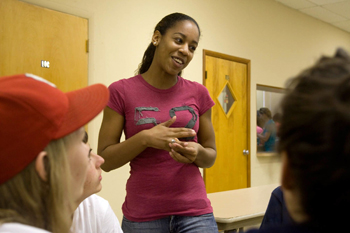When Vanessa Silverman interviewed for the city director position at Discovering Opportunities for Outreach and Reflection (DOOR), no one -- least of all Silverman -- really expected her to get the job.
“I had so many things against me,” she said. Could Silverman, who was barely out of high school, organize and oversee groups of as many as 65 individuals who travel to Miami to share in weekend, weeklong, semester, summer and even yearlong service-learning trips? Could Silverman, a full-time University of Miami student, lead DOOR’s agenda of a Psalm 46:5 experience of seeing that “God is in the midst of the city”?
Yet, for more than two years now, Silverman, 21, has done all that.
“She blew us away in the interview, with her maturity and with her ability to articulate her faith and work through her faith,” said Krista Dutt, DOOR’s national program director, noting that there were 20 other applicants for the job.
Silverman not only landed the position but is also helping DOOR make an important discovery: When it comes to leadership, go for the home-team advantage.
Local leaders play a crucial role in fulfilling the organization’s mission to help its travelers “experienc[e] God’s love and shalom in ever-expanding new ways [so] we can share and demonstrate God’s alternatives to the evils of racism, poverty and violence that tear down our communities and lives.”
Currently, half of DOOR’s six cities include leaders who are natives of the communities they serve. They include Brian Sales, the city director in Chicago, who started with DOOR at 16 as a junior summer employee. Eduardo Vargas, the San Antonio assistant city director, grew up there and worked with DOOR as a teen. After going away to college, Vargas rejoined DOOR in San Antonio, which has a 15-year history of hiring staffers from the neighborhood.
Questions to consider
Questions to consider:
- What practices enable you to “see God in the midst of the city”?
- How are young leaders formed to assume institutional responsibilities?
- Local leadership plays a key role in building thriving communities. What are you learning from local leadership? How are you cultivating local leadership?
- What are your strategies for recruiting, training and retaining young leaders?
“It’s different when you grow up there,” said Dutt, who comes from Ohio and now lives in Chicago. “[It’s] an integrity issue for us. We are not wanting transplants like me to tell the story of the city.”
Silverman, born and raised in South Miami to a Caribbean-Dutch mother and Dominican father, routinely hosts groups, ages 13 and up and from varying denominations. She assigns them to work in places such as homeless shelters, elderly ministries, food banks and community gardens in the Little Havana, Little Haiti and predominantly black Overtown neighborhoods.
“Everybody knows that Miami has a huge Hispanic population, Haitian population,” she explained, “but when they go into CVS or into a neighborhood store, and the clerk does not speak English, that’s intense for them. It’s culture shock because Miami is like another country within the United States ... I enjoy it a lot when people are able to see and experience a lot of diversity.”
Silverman’s introduction to DOOR came through her involvement with another ministry in her hometown. Beginning at age 9, she had studied piano and guitar with an organization called Miami Music Ministries.
“This is a ministry that is geared to raising Christian leaders within the community through musical talents,” Silverman said. Its traveling band played for DOOR’s Thursday night worship services led by Silverman when groups were in town.
When the wife of Miami Music Ministries founder Richard Aspinwall became DOOR's national director for volunteers in 2008, Aspinwall recommended Silverman as her assistant.
“Her husband told her I’d be great, and she took his word for it,” Silverman said. “I felt like it was God opening up another door for me.”
Once on board, Silverman says she learned even more about the community she has called home and loved all her life.
“My eyes were open to opportunities to serve people within my community and to let other people see how beautiful my community is,” she said.
People who start with DOOR as teens often have moved into leadership because of the relationship the organization forges with them, Heidi Aspinwall said. After the teens’ paid summer jobs end, the staff keeps those relationships in mind, and so do the young people. When they start looking for jobs after college, some come back.
“It’s all about relationships,” Aspinwall said. A recent initiative to hire 50 percent of the summer staff from the local community should continue that pipeline for local talent.
The organization approaches its work with the “foundational knowledge that God is already there and working,” which in turn places the responsibility on DOOR to seek out the leaders God has already placed in the community, Aspinwall said. “Then you will encounter amazing people like Vanessa,” she said.
Today, as city director, Silverman takes her groups into everyday Miami -- where more than 150 languages are spoken in the public schools -- not the Miami they hear about or see on TV. Along the way, they interact with personalities and cultures they might not encounter back home.
“Our goal for them is to see the face of God in the city,” Silverman said. “A lot of people, when they go on a mission trip, think they are bringing God with them…The reality is God is already here. He’s here and working.”






